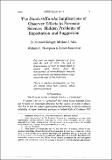| dc.contributor.author | Risinger, D. Michael | |
| dc.contributor.author | Saks, Michael J. | |
| dc.contributor.author | Thompson, William C. | |
| dc.contributor.author | Rosenthal, Robert | |
| dc.date.accessioned | 2009-07-27T19:18:03Z | |
| dc.date.issued | 2002 | |
| dc.identifier.citation | Risinger, D. Michael, Michael J. Saks, William C. Thompson, and Robert Rosenthal. 2002. The Daubert/Kumho implications of observer effects in forensic science: Hidden problems of expectation and suggestion. California Law Review 90(1): 1-56. | en |
| dc.identifier.issn | 0008-1221 | en |
| dc.identifier.uri | http://nrs.harvard.edu/urn-3:HUL.InstRepos:3199069 | |
| dc.description.abstract | After the Supreme Court's decision in Kumho Tire v. Carmichael and the recent amendment of Federal Rule of Evidence 702, proffers of expert testimony will have to be found reliable for the particular application of the asserted expertise to the "task at hand." That is, expertise which is reliable in some global sense, which might apply to other cases but not to the particular application before the court, does not satisfy the requirements for admission. With that in mind, this article examines the phenomoenon of "observer effects" and the vulnerability of forensic science examinations to such observer effects. Observer effects occur when the results of an examination are distorted by the context and state of the observer, including the observer's expectations and desires. The article reviews the findings and practices of a range of scientific fields concerning such observer effects and their control, with special attention to the relevant research and theory from cognative and social psychology. This literature establishes that in virtually every area of human judgment, such observer effects have a relentless and sometimes dramatic effect on the accuracy of results. The article then examines current forensic science practice in light of that research, concluding that forensic science practice is far behind most scientific fields in controlling for such effects, leaving the reliability and accuracy of many forensic science results in doubt. The article then suggests practical ways in which forensic science practice can be changed to reduce such problems, such as the adoption of blind testing regimes. Finally, the article analyzes the current state of the law under Kumho Tire and Rule 702, concluding that the results of forensic science examinations are in danger of being excluded if their reliability continues to be undermined by the failure to control observer effects. | en |
| dc.description.sponsorship | Psychology | en |
| dc.language.iso | en_US | en |
| dc.publisher | California Law Review Inc. | en |
| dc.relation.isversionof | http://www.jstor.org/stable/3481305 | en |
| dc.relation.hasversion | http://papers.ssrn.com/sol3/papers.cfm?abstract_id=301408 | en |
| dash.license | LAA | |
| dc.title | The Daubert/Kumho Implications of Observer Effects in Forensic Science: Hidden Problems of Expectation and Suggestion | en |
| dc.relation.journal | California Law Review | en |
| dash.depositing.author | Rosenthal, Robert | |
| dc.identifier.doi | 10.2307/3481305 | |
| dash.contributor.affiliated | Rosenthal, Robert | |


